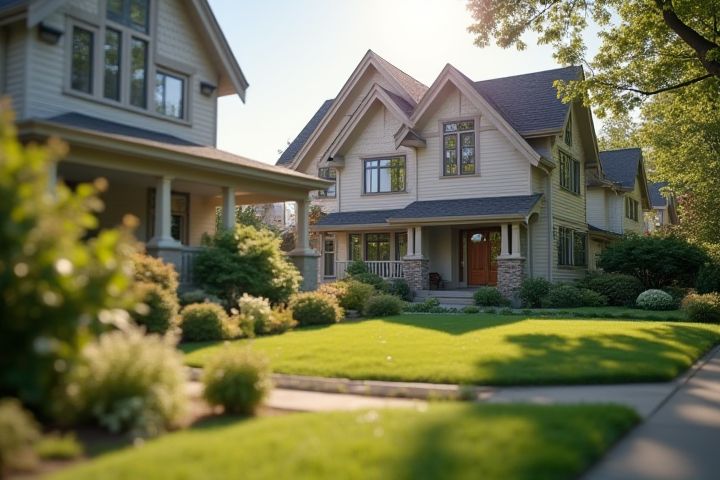
House prices in a neighborhood are influenced by various factors, including location, local amenities, and school quality. Proximity to essential services such as grocery stores, parks, and healthcare can enhance property value significantly. The presence of reputable schools often attracts families, driving up demand and prices in those areas. Additionally, the overall economic health of the region, characterized by unemployment rates and local job opportunities, plays a vital role in shaping the real estate market. Lastly, the aesthetic appeal of the neighborhood, including property maintenance and community engagement, can also impact home values.
What Factors Affect House Prices In A Neighborhood
Location desirability
Location desirability significantly influences house prices, with proximity to essential amenities such as schools, parks, and shopping centers playing a crucial role. Neighborhood safety is another critical factor, where areas with lower crime rates typically command higher property values. Access to public transportation and major highways can enhance convenience, making homes in well-connected neighborhoods more attractive to buyers. Furthermore, community features like aesthetic appeal, local culture, and demographics can impact your perception of a neighborhood, ultimately reflecting in its housing prices.
School district quality
School district quality significantly impacts house prices in a neighborhood, with properties located in areas served by highly-rated schools often commanding up to 20% higher prices. Research indicates that homes within a top-tier school district can appreciate faster than those in lower-rated districts, with a typical annual increase of 3-5% more. Parents prioritize educational opportunities, leading to increased demand for homes near acclaimed schools, specifically those with excellent test scores and college readiness rates. This heightened demand creates a competitive real estate market, further driving up home values in sought-after districts.
Crime rates
Crime rates significantly influence house prices in a neighborhood, often deterring potential buyers due to safety concerns. Areas with higher crime statistics typically see a decrease in property values, as prospective homeowners prioritize safety over other features. In contrast, neighborhoods with lower crime rates generally attract more buyers, leading to increased demand and higher home prices. Moreover, communities that implement effective crime prevention strategies, such as neighborhood watch programs, can experience a noticeable uptick in property values.
Proximity to amenities
Proximity to amenities plays a crucial role in determining house prices, with homes located near shops, schools, parks, and public transportation often commanding higher values. Properties within a one-mile radius of high-ranking schools can see price increases of 10% to 20%, as families prioritize education. Access to recreational areas, such as parks or gyms, contributes to increased demand, influencing market trends and reducing vacancy rates. Your home's resale value might be significantly enhanced if it is strategically situated near essential services and community facilities.
Employment opportunities
Employment opportunities are crucial in determining house prices within a neighborhood, as higher job availability attracts potential buyers and renters. Areas with a low unemployment rate, typically below 5%, show increased demand for housing, driving prices upward. Furthermore, the presence of major employers or industries can raise home values by providing stable income sources for residents. As you consider purchasing a home, evaluating the local job market, average salaries, and the types of industries present can significantly influence your investment decision.
Local economic conditions
Local economic conditions significantly impact house prices in a neighborhood, with employment rates being a primary factor; areas with lower unemployment often see higher demand for housing. Median household income also plays a crucial role, as neighborhoods with affluent residents typically experience increased property values. Furthermore, the presence of local businesses and economic development initiatives can drive up demand, leading to higher prices. You should consider these factors when assessing potential home investments in a specific area.
Infrastructure upgrades
Infrastructure upgrades significantly influence house prices in a neighborhood by enhancing accessibility and overall living standards. Improved roads, public transportation options, and utilities can lead to increased demand as potential buyers prioritize convenience and connectivity. Enhanced community amenities, such as parks, recreational facilities, and schools often accompany these upgrades, making the area more attractive to families and individuals alike. Consequently, these factors can elevate property values and yield a higher return on investment for homeowners.
Zoning laws and regulations
Zoning laws and regulations significantly influence house prices in a neighborhood by dictating land use, building density, and property types. In areas where zoning allows for a mix of residential and commercial properties, house prices often rise due to increased demand and potential for economic growth. Conversely, strict zoning regulations can limit development, leading to a scarcity of housing options and consequently driving up prices. Understanding your neighborhood's zoning laws can provide insights into potential future developments and their impact on property values.
Property taxes
Property taxes significantly influence house prices in a neighborhood, as higher taxes can deter potential buyers and reduce overall demand. For instance, a community with an average property tax rate of 2% may see lower home values compared to one with a 1% rate, resulting in a price difference of thousands of dollars. Specific amenities funded by property taxes, such as schools and parks, can enhance desirability, but only if perceived value aligns with tax burdens. Therefore, understanding your local tax structure and its implications on property value is crucial when considering a home purchase.
Market supply and demand
Market supply and demand significantly influence house prices in any neighborhood. When housing supply is limited--due to factors like zoning regulations or lack of new developments--prices tend to rise, driven by competition among buyers. Conversely, high demand coupled with a robust economy can increase property values, as more individuals seek homes in desirable locations. Additionally, the overall condition of the housing market, including interest rates and economic indicators, plays a crucial role in shaping these dynamics, affecting your investment potential.
